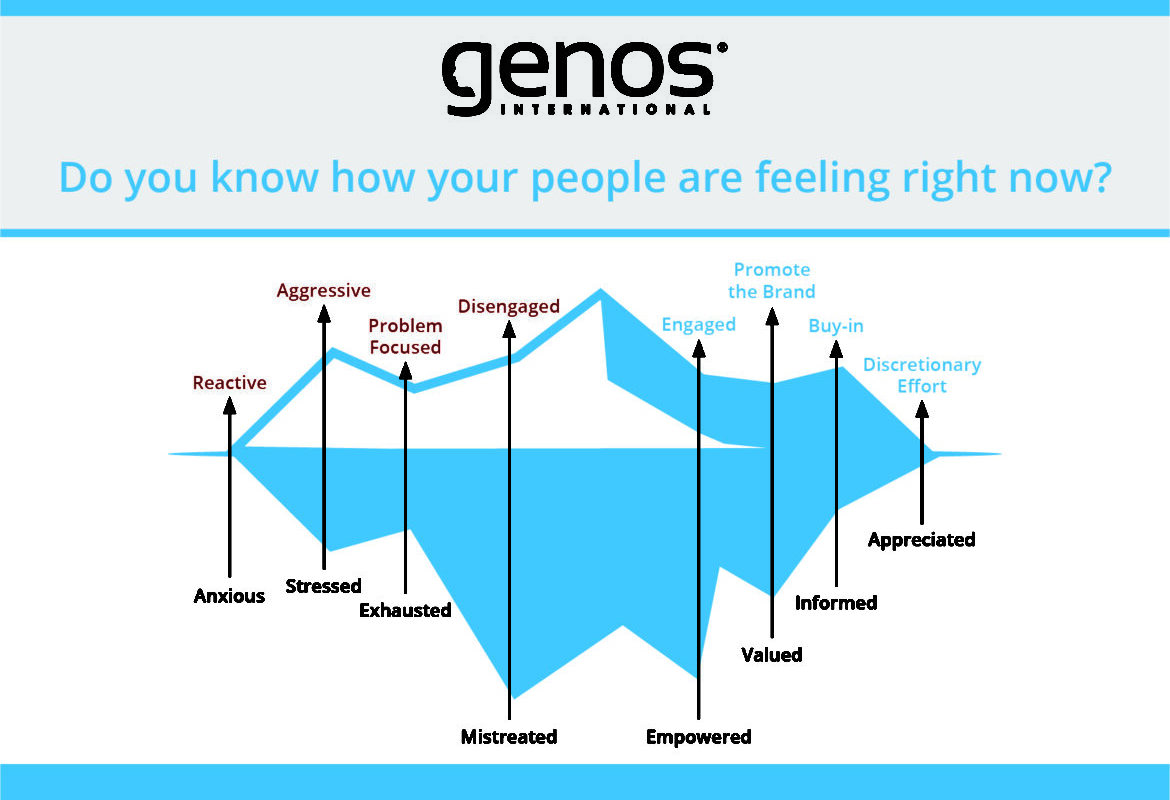There is an abundance of research on the impact emotions have on an individuals’ performance in the workplace. It shows that people often perform their worst when they experience unproductive feelings, such as feeling frustrated, concerned, stressed, inadequate, and fearful.
Research also shows that people perform their best when they feel involved in purposeful work that develops who they are… and when they feel valued, cared for, consulted, respected, informed and understood.
So, how can developing your leadership help ensure your people feel and perform their best?
Leadership is fundamentally about facilitating performance, getting others to do their best, and to do their work effectively and efficiently. One of the most robust, consistent findings in the area of social sciences is that there is a direct link between the way people feel and the way people perform. As such, leaders need to be skilled at identifying, understanding and influencing emotion within themselves and others in order to inspire performance.
Emotionally intelligent leadership is about leaders intelligently using emotions to facilitate high performance in themselves and others.
In the Emotionally Intelligent Leader program, participants first partake in a personal Genos EI Leadership Assessment, in order to understand “how they are showing up at work.”
Attendees will improve their understanding of emotions and emotional intelligence. They will also explore and practise tools and techniques for applying emotional intelligence in leadership, and creating conditions for others to achieve high performance.
In the program, attendees will:
- explore the neuroscience of emotions and emotional intelligence,
- examine tools and techniques for effectively asking for, and responding to, feedback,
- explore techniques for developing self and other awareness,
- examine how we can use reactive and proactive techniques to build our resilience and effectively manage strong emotions, and
- explore an approach for facilitating engagement discussions with staff members.
- explore techniques for applying EI in leadership, and creating high performance in others.
The material for the program is based on the Genos Emotional Intelligence Leadership Model.
The Genos model of emotionally intelligent leadership has been developed from over a decade of research work examining how effective leaders use emotional intelligence abilities in their leadership of others.
The model comprises six emotionally intelligent workplace competencies. These competencies represent skills and behaviors based on underlying abilities and experiences that are measurable, observable and critical to successful job performance.
The six Genos EI Competencies are:
- Self-Awareness
- Awareness of Others
- Authenticity
- Emotional Reasoning
- Self-Management
- Inspiring Performance
Self-awareness is about being aware of the behaviors you demonstrate, your strengths and limitations, and the impact you have on others. Leaders high in this skill are often said to be present rather than disconnected with who they are. Self-awareness is important in leadership because:
- a leader’s behavior can positively or negatively impact the performance and engagement of colleagues
- leaders need to know their strengths and limitations in order to continuously improve and maintain success
- leaders’ interpretation of events at work is both made by, and limited by, their intelligence, personality, values and beliefs.
- In order to objectively evaluate events, leaders must know how they interpret the world and how this helps and limits them.
Awareness of others is about noticing and acknowledging others, ensuring others feel valued, and adjusting your leadership style to best fit with others. Leaders high in this skill are often described as empathetic rather than insensitive to others and their feelings. Awareness of others is important in leadership because:
- leadership is fundamentally about facilitating performance, and the way others feel is directly linked to the way they perform
- awareness of others is necessary in order to take effective steps to influence and facilitate others’ performance
- to get the best out of people, leaders need to adjust their leadership style to best fit with the people and situation they are leading.
Authenticity is about openly and effectively expressing yourself, honoring commitments and encouraging this behavior in others. It involves appropriately expressing specific feelings at work, such as happiness and frustration, providing feedback to colleagues about the way you feel, and expressing emotions at the right time, to the right degree and to the right people. Leaders high in this skill are often described as genuine, whereas leaders low in this skill are often described as untrustworthy. Authenticity is important in leadership because:
- it helps leaders create understanding, openness and feelings of trust in others
- leaders who are guarded, avoid conflict, or are inappropriately blunt about the way they feel can create mistrust, artificial harmony and misunderstandings with those around them
- leaders need their people to be open with them. If, as a leader, you do not role-model this behavior, your direct reports will be guarded with you.
Emotional reasoning is the skill of using emotional information (from yourself and others) and combining it with other facts and information when decision-making. Leaders high in this skill make expansive decisions, whereas leaders who are low in this skill often make more limited decisions based on facts and technical data only. Emotional reasoning is important in leadership because:
- feelings and emotions contain important information, for example, if a colleague is demonstrating frustration or stress, these feelings provide insight that they are going to be less open and supportive of new ideas and information
- the workplace is becoming more complex and fast-paced; this requires quick, good decision-making where all the facts and technical data are not available (gut feel and intuition are important in these environments)
- people are influenced by emotion; if you fail to consider how people are likely to feel and react to decisions made, you may not achieve the appropriate buy-in or support for your decisions.
Self-management is about managing your own mood and emotions, time and behavior, and continuously improving yourself. This emotionally intelligent leadership competency is particularly important. Leaders high in this skill are often described as resilient rather than temperamental in the workplace. The modern workplace is one of high work demands and stress, which can cause negative emotions and outcomes. Self-management is important in leadership because:
- a leader’s mood can be very infectious and can, therefore, be a powerful force in the workplace; one that can be both productive and unproductive
- this skill helps leaders be resilient and manage high work demands and stress
- to achieve, maintain and enhance success, leaders need to pay conscious attention to the way they manage time, how they behave and to continuously improve how they lead others.
Inspiring performance is about facilitating high performance in others through problem solving, promoting, recognizing and supporting others’ work. An individual’s performance can be managed with key performance indicators. This is important, however, research has shown that this “compliance” style often fails to drive discretionary effort and high performance. Leaders who combine this with a more inspiring style often empower others to perform above and beyond what is expected of them. Inspiring performance is important in leadership because:
- leadership is fundamentally about facilitating the performance of others,
- managing performance with rules and key performance indicators usually produces an “expected” result rather than an “unexpected” high-performance result
- people often learn and develop more with this type of leadership style, resulting in continuous enhancements to performance year on year.




